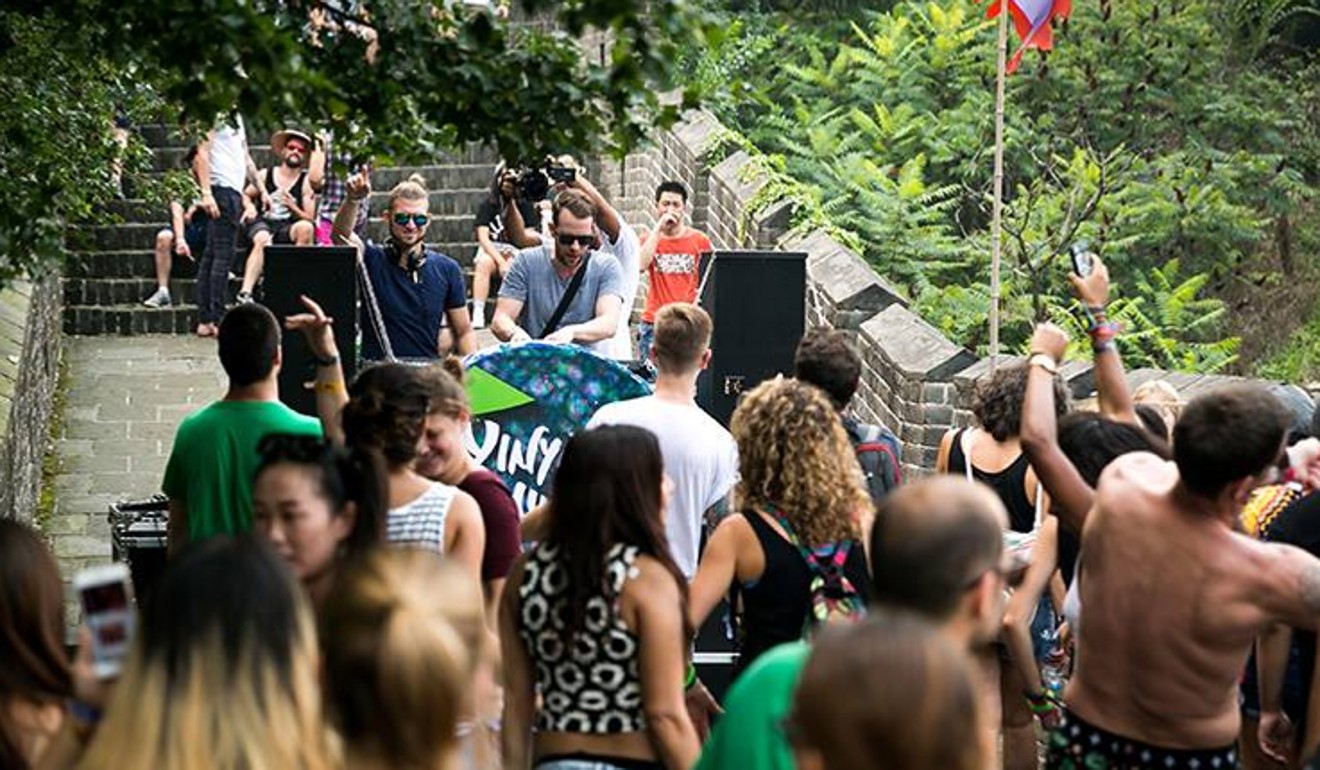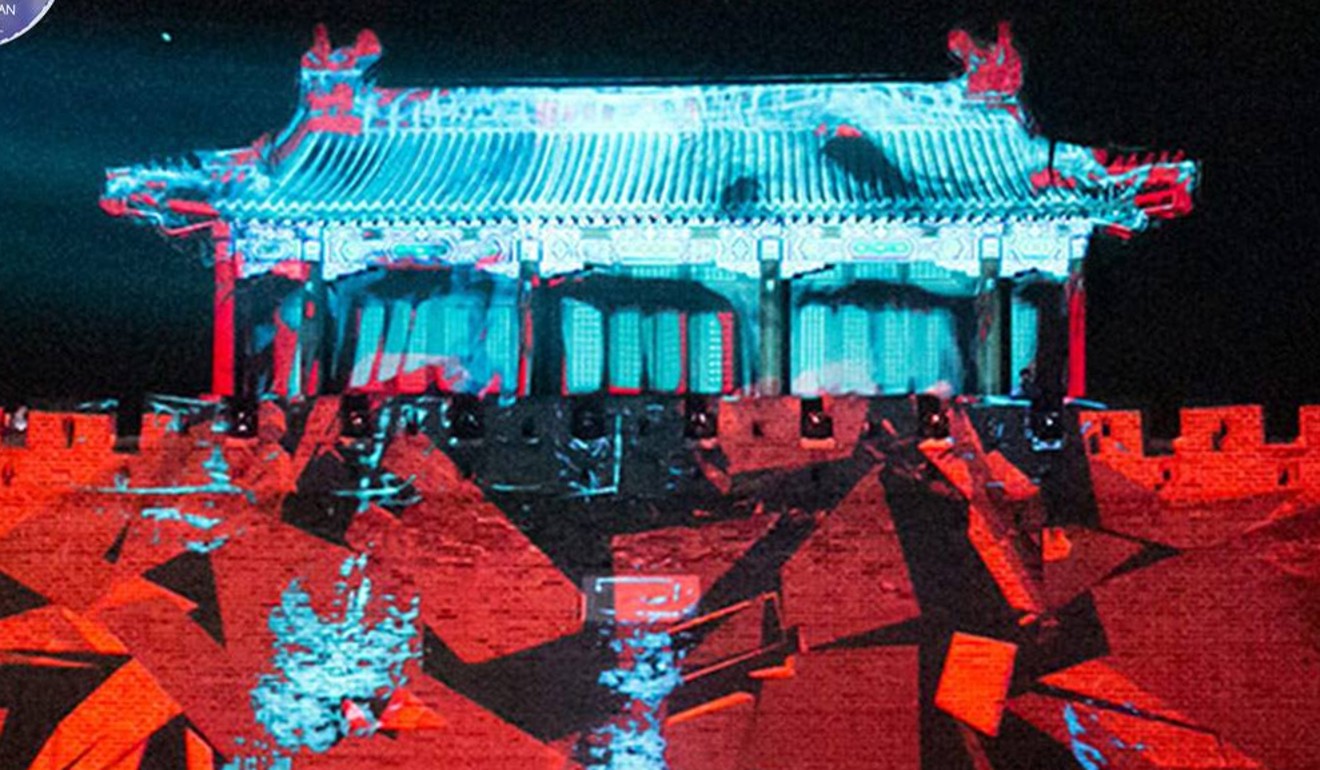
In China, music festival organisers conquer the Great Wall
It’s not easy putting together a music event on the mainland, but Tommy Hendriks says even if they have to change location the show will go on
Over 1,400 years ago, the Huangyaguan section of the Great Wall was built to protect China from northern intruders. Now it has a new set of outsiders descending on it: electronic music lovers.
From Sunday to Tuesday, 1,000 revellers turned up to dance, drink and even do yoga at the YinYang Music Festival on Huangyaguan, a remote part of the wall 120km from Beijing.
The festival was launched in 2014 by Tianjin-born Rainbow Gao and her Dutch partner, 28-year-old Tommy Hendriks, both of whom are based in Shanghai.
It’s the fourth year the festival has been held at Huangyaguan, but Hendriks says growing pressure from the Chinese government could mean it’s the last at that location.
Gao and Hendriks made the move into music festivals after running The Mansion in Shanghai, a well-known electronic music club that doubles as a cultural centre.
Unusually for a festival, YinYang is not commercial, so festival-goers can skip the typically pricey fare and bring their own food and drink, and they can camp near the wall. There are no artist fees, so the people who play at the event are there to have fun too.

“There’s no separation between rich and poor, or between a rich artist and poor artist, or VIP customer or normal customer. It’s a little bit like communism,” Hendriks quips.
How did you get the idea to do a festival on the Great Wall?
A few years ago, I still was a little bit ignorant. I wanted to get really cool acts to come to China, and organise tours for them. So I did some tours and I was talking with my Chinese partner Rainbow, saying how can we get a higher level of artists who are interested in coming to China. Of course, for international people, if you can say you once DJ-ed or played at the Great Wall, you are so happy. But then I find out it’s really no fun to do all this artist managing and organise China tours, so in the end we didn’t go on with that idea. We got more and more focused on music festivals and other cultural projects.
What were some of the challenges involved with organising a festival on the Great Wall?
One of the main challenges is Western people, if they go to a festival, they tend to get really wild. Back home, when you go to festivals, everything is allowed almost. If something goes wrong with a festival in China, most likely it will close down. In 2004 there was another festival at the Great Wall and a foreigner who was very drunk fell from the Great Wall and broke some parts of his body. For 10 years, the Chinese government didn’t allow anybody to do a festival on the Great Wall. So this is a really big challenge: how can we make sure our festival is safe enough that people cannot do these kinds of stupid things, which is actually an impossible task.

Chinese people right now are not really interested in non-commerical things. They really want to see a superstar and hang out in a VIP area where you can show off and drink champagne. We don’t have this kind of aspect, so it’s a little bit hard for us to attract many Chinese people to come to our festival.
And then a third problem is, organising festivals in China is a little bit of a grey area. After the Tiananmen Square protest in 1989, you’re not allowed to gather outside with big groups of people and talk about politics – it’s forbidden by law. Of course a music festival is not exactly that, but it’s also not something that is really supported by the government. It’s sort of allowed, but officially not really. So this whole thing is very fragile, and we always face a lot of problems with getting licences.
With the new president in China, Xi Jinping, he really doesn’t want China to become like the West. For a drugs and party culture, he said he doesn’t want China to be like Europe and America where governments sort of support this, and he wants the Chinese people to be more productive.
We don’t know, maybe this year will be the last in this location. The local government is really happy because we bring a lot of money to the village – they are making a lot of money selling drinks. They are really happy with us, but they are losing the power. So we will see for next year whether we can do it again here.
But that’s China. My lifestyle is pretty much living day by day because many things are uncertain.
What about the historical protections around the wall – did that create any problems?
It’s good promotion for the Great Wall. There is a government organisation called the Great Wall Society and their job is to make the Great Wall not only be seen as a place you could walk and which was built 2,000 years ago, but also where the culture can flourish, where you can do marathons, do commercial activities. So they are really happy.
What’s the vibe of the festival like?
It’s like a really big group of friends being really respectful of the place where they are, and they just come to have a really good three days. So far we never had any problems, everybody is so polite and so friendly. All the artists, because they don’t get an artist fee, they really come to have fun.
What’s the music festival scene in China like?
For us, it’s actually harder now to do a festival than four years ago. A lot of Chinese people, when they think about electronic music, they think about a massive stage with 20 lasers and the number one DJ of the world saying, “I love everybody, put your f***ing hands up”.
Sometimes when Chinese people go to our festival, they’re not interested. It’s not commercial and they just feel a little bit disappointed – it’s not the EDM they expected. The competition has grown as well. Four years ago there was the first electronic music festival in Shanghai, now you have 15 to 20 electronic music festivals in Shanghai.
Why are Chinese people getting into electronic music?
Right now, the young Chinese generation is a little bit different from the older Chinese generation, who are really into rock music. The young Chinese generation grew up with the internet, with international artists, they have everything they want. So they’re not really angry – they like music which is mostly a pretty happy music style.
What’s your next plan?
[If it’s the last festival at this location] we will find another place to do it, like maybe in the desert. We will find another location, maybe an even cooler location than this. We still want to do every year one festival in a very outstanding location in China. For sure we will go on with this.

